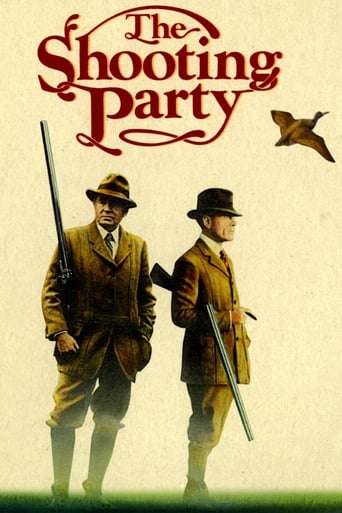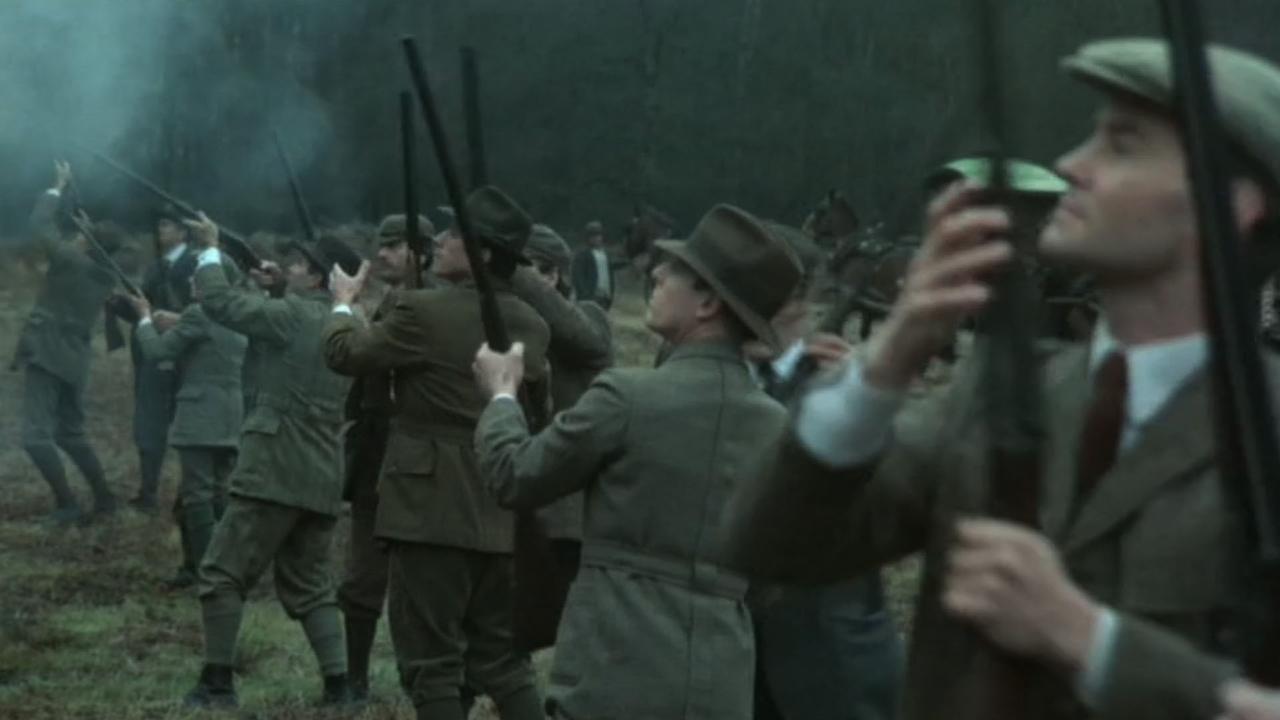Gareth Critchfield
I cannot believe how badly the point of this film must have been missed! I am no snob, but people can't have understood the core ideas behind the film as otherwise it would be regarded as a classic.I thought the film was very sad and a great reflection on a English time and traditions passing. The time of drinking fine wines and eating fresh game will be shortly over with the pending war.James Mason is just perfect in this film! He represents the "good old boy" with principles and values that the younger more competitive Edward Fox misses. This partnership is a beautiful juxtaposition, both understated and acted masterfully.ANyway, slight rant over but please watch again if you were not sure one way or the othergareth
James Hitchcock
In the autumn of 1913, a group of guests assemble at Nettleby Hall, the country seat of Sir Randolph Nettleby, for a shooting party. (References to Dorking and Hindhead suggest the film is set in Surrey). Shooting was an upper-class obsession in the nineteenth and early twentieth centuries; the "Summer Season" of social gatherings always ended in early August to allow the aristocracy to travel to the Scottish moors for the start of the grouse season on the "Glorious Twelfth". Once that was over, they returned to their English estates in October for pheasant shooting. Winter was the season for wildfowling on the marshes.A more recent British film, "Gosford Park", also featured a shooting party at a stately home. In that film, the owner of the house, the parvenu businessman Sir William McCordle, is both deeply unpleasant and deeply unpopular; when he is murdered halfway through there is no shortage of suspects as he was hated by many of his family, his guests and his domestic staff. Sir Randolph, by contrast, is a gentleman of the old school, intelligent, thoughtful and decent, popular with both his fellow-aristocrats and with his servants and tenants. Although his position obliges him to host gatherings such as this one, he has mixed feelings about them. He feels that the upper classes take their pleasures too seriously, something he regards as a sign of a civilisation in decline. When the shoot is interrupted by Cardew, an elderly and eccentric animal lover, Randolph does not have him charged with trespass or manhandled off the estate by his servants (as many landowners would have done) but instead calmly debates with him.Among Sir Randolph's guests are another aristocrat, Lord Gilbert Hartlip, and Lionel Stephens, a young lawyer. Both are excellent shots and there is intense rivalry between them as they compete to see who can kill most birds. We also learn something of their private lives. Lord Gilbert is trapped in an unhappy marriage, and both he and his wife have taken lovers. She is a compulsive gambler; among the other guests is one of her lovers, the wealthy businessman Sir Reuben Hergesheimer, who has agreed to pay off her debts in exchange for sexual favours. Stephens is in love with Olivia, the beautiful young wife of the much older Lord Lilburn. Although she returns his love, the affair seems doomed, as the social conventions of the day frowned upon divorce. There is a tragic conclusion to the rivalry between Hartlip and Stephens; desperate to prove himself the better shot, Hartlip continues to fire recklessly after the order to stop has been given, and one of the beaters is hit.The film features a selection of some of Britain's best-known actors, including James Mason, John Gielgud, Edward Fox and Gordon Jackson. This was Mason's last role before his death, and one of his best. Towards the end of his career he played a number of world-weary aristocrats, reluctantly facing the decline of their once-secure world, such as Franz Josef in "Mayerling" and Klugemann in "The Blue Max", and Sir Randolph is another. There are too many good performances to mention them all, but I must single out Cheryl Campbell as Lady Hartlip, Fox as her husband and Judi Bowker as Olivia.The date of the film is, of course, significant. 1913 was to be the last shooting season before the ruling classes of Europe decided that killing humans took precedence over killing birds. Autumn is traditionally the season for pheasant shooting, but in this film there is an obvious symbolic significance to the time of year. The prevailing colours are dull ones- browns, greys, muted greens and yellows with few bright tones. This is an autumn of mists and overcast skies, not an autumn of brilliant colours like the one in "Far from Heaven". Autumn becomes a symbol of a society in decline. The slaughter of the birds is a symbol of the much greater slaughter which was to start the following year. This sense of decline and decadence pervades the film; even a sensitive and kindly man like Sir Randolph, who foresees the coming war with Germany, believes that war might be a good thing, a chance to rebuild a new society on the ruins of the old. Today, of course, we know that the war was to prove far bloodier than anyone had foreseen and that the new world which arose after it was in most respects worse than the old one, so talk like that sounds to our ears like dangerous nonsense. In 1913, however, it must have seemed dangerously seductive.The year is significant for another reason. 1913 was not only the year before the outbreak of World War One, it was also two years after the passing of the Parliament Act 1911 which had restricted the power of Britain's House of Lords to block Government legislation. The aristocracy retained their wealth and privilege, but their political power was starting to wane following the introduction of universal male suffrage and the growth of more populist politics. The film makes mention of David Lloyd George, the radical Chancellor of the Exchequer and a popular figure among the working classes for his opposition to aristocratic privilege. There was to be no Russian-style revolution in Britain, so the war did not see the end of the country house lifestyle; it continued throughout the twenties and thirties ("Gosford Park" is set in 1932) and, to some extent, still persists today. Nevertheless, the aristocracy have never again held the central role in society which was theirs before the twentieth century.The eighties were perhaps the decade most associated with the "heritage cinema" movement in Britain. Although it is visually much more restrained than, say, the work of Merchant Ivory, Alan Bridges' film is an excellent example of this tradition, a haunting and elegiac commentary on the inevitable processes of social change. 8/10
wulfstan
Somewhere there should be a private museum dedicated to memorializing one of the most important vanished species-- the lady.While it is easy to see the fine acting of Gielgud, Mason, Fox and the other men, what no one has yet commented on is the equally fine work of a too-seldom seen actress... Judi Bowker.As Lady Olivia, she shows the compassion, consideration, perfect balance, and dedication of an Edwardian lady at her finest. She is not only a luminous beauty, but she is moved by a gallant and delightfully indirect invitation to adultery by Lionel, but does not succumb for her own reasons. She notices what happens to the children, she treats every other person in the film as an individual, and her unselfishness in no way detracts from her presence. Miss Bowker's subtle performance is well worth a careful look.THE SHOOTING PARTY is clearly an envoi to a vanished era. But in an age that can't see the difference between Melanie Wilkes and Scarlett O'Hara that was Margaret Mitchell's key contrast and thinks SEX AND THE CITY is a model for feminine conduct, Judi Bowker's performance is a revelation,
Ben Trovato
Banal carnage. A nice allegory, just as a game keeper raises birds for sport so a social order, a decaying aristocracy, breeds masses for war. Trouble is these particular aristocrats ARE actually as boring as they are bored, and waiting around the whole film for the last minute is slightly tedious. A nap before tea is recommended. The atmosphere is perfect. Gielgud is great as an eccentric caricature -- when will a vegetarian be portrayed as anything but a looney in a movie? Mason is perfect as the button-down aristo so shocked that his shooting party should result in human death, so close to death himself. Is the movie too weighty from all the irony? I liked it, 7 out of ten.


 AD
AD



